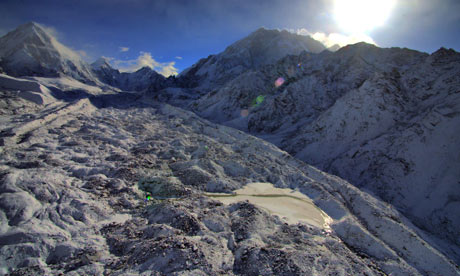The UN called in the world's top scientists today to review a report by its climate body, four months after public confidence in the science of global warming was shaken by the discovery of a mistake about the melting rates of Himalayan glaciers.
In an announcement at the UN in New York Ban Ki-moon, the UN secretary general, and Rajendra Pachauri, the much-criticised head of the Intergovernmental Panel on Climate Change, said the InterAcademy Council, which represents 15 national academies of science, would conduct the independent review.
The announcement follows months of controversy which, while not altering the scientific consensus on climate change, has given fresh ammunition to opponents of action on global warming.
Pachauri has faced calls for his resignation, a controversy he acknowledged obliquely today. "We have received some criticism. We are receptive and sensitive to that and we are doing something about it," he said.
The review, which is to complete its work by August, will not undertake a dissection of the 2007 report, which has been pored over by climate sceptics, or re-examine the scientific consensus that human activity is causing climate change, said Robert Dijksgraaf, the head of the InterAcademy Council.
"It will definitely not go over vast amounts of data," he told reporters. "Our goal will be to assure nations around the world that they will receive sound scientific advice on climate science."
Instead, he said it would focus on putting in place better quality control procedures for the next report, which is due in 2014.
These would include guidelines for dealing with material that has not undergone peer review such as the item on Himalayan glaciers.
One focus of the review would be the role played by Pachauri who has been criticised for his handling of the error when it first came to light.
Djiksgraaf also said the panel, likely to be made up of 10 experts, would also look at procedures for making corrections in a timely and transparent manner.
The report has been pored over by climate sceptics for errors since last November when it emerged that the IPCC had stated, wrongly, that Himalayan glaciers could melt by 2035. As Pachauri and Ban noted today, the solid body of the 3,000 page report remained unchallenged.
The discovery of the error goes to the core of criticism of Pachauri whose first response to questions about the accuracy of the IPCC's prediction on the melting of the Himalayan glaciers was to dismiss it as "voodoo science".
Pachauri had also rankled critics by refusing to apologise for the mistakes.
But a spokesman for Pachauri today said the IPCC had initiated the independent review, and had pressed the UN to call in the scientists.
In his brief comments, Pachauri said the work of the IPCC, which shared a Nobel prize with Al Gore in 2007, remained the gold standard of climate science. "We believe the conclusions of that report are really beyond any reasonable doubt," Pachauri said.
Environmental and science organisations supported the UN's decision.
"This is the right move," said Peter Frumhoff, the science director for the Union of Concerned Scientist and a lead author on the IPCC report.
"If this independent review is carried out with rigour and transparency, it will help strengthen the IPCC's commitment to robust scientific assessments and restore public confidence that has been shaken by an aggressive campaign to sow confusion about climate science."








